Pour vs. Pore
What is the difference?
Pour and pore are two words that cause English learners and native speakers confusion. They are an example of homophones. Homophones are words that sound alike but have different meanings, or spelling or both. It is important to learn the correct meanings and uses of homophones. It will allow you to use the words correctly in conversation and writing. With practice, you will be able to master both of these words.
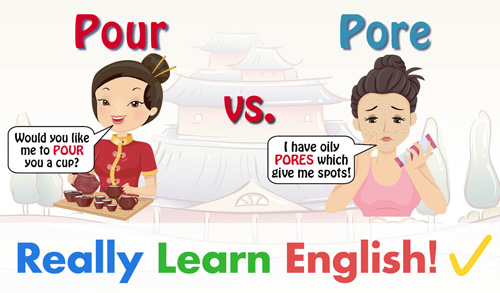
Click Here for Step-by-Step Rules, Stories and Exercises to Practice All English Tenses
Pour
Pour is to move something (especially a liquid) in a steady stream.
Examples:
- Water was pouring off of the roof.
(Water was streaming off of the roof.)
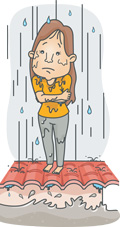
- I poured the water all over the plants.
(I streamed water all over the plants.)
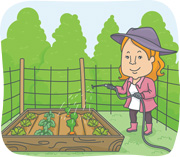
- I poured the orange juice into the jug.
(I put the orange juice into the jug.)

Pour also means to rain heavily.
Examples:
- It was pouring yesterday when I came home.
(It was raining heavily yesterday when I came home.)
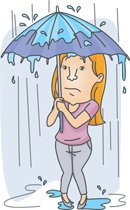
- The weather forecast says it is going to pour all week.
(The weather forecast says it is going to rain heavily all week.
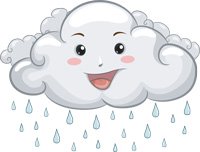
- It pours in my province all summer long.
(It rains heavily in my province all summer long.)
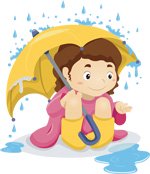
Pour also means to make or serve a drink.
Examples:
- The bartender poured her a drink.
(The bartender made her a drink.)

- Please pour me a cup of tea.
(Please make me a cup of tea.)

- I poured wine for the whole table.
(I served wine to the whole table.)
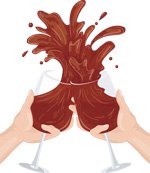
Collocations
Collocations are commonly spoken phrases in English that occur naturally in speech. Becoming familiar with collocations will allow you to speak naturally with others and provide smooth dialogue in conversations.
Pour Collocations
- Pour out
Example: Pour out the water from the pot.

- Pour up
Example: Pour up a drink for us!
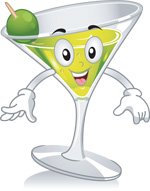
- Pouring rain
Example: It's pouring rain outside today.

- Pour over
Example: I poured the milk over the cereal.

Pore
As a noun, a pore refers to a very small opening in the skin. We have pores all over our bodies that produce sweat and other particles.
Examples:
- Sweat is coming from all of my pores because it is so hot today.
(My skin is sweating a lot today because it is so hot today.)

- My brother has skin problems because of his clogged pores.
(My brother has skin problems because of the clogged openings in his skin.)

- I have oily pores on my face.
(My face produces a lot of oil.)

When pore is a verb, it means to study or look at something very intently.
Examples:
- I pored over all of my textbooks while studying last night.
(I read all of my textbooks while studying last night.)

- The class pored over the museum's exhibit.
(The class studied the museum's exhibit.)

- We pored over yesterday's events to try to understand them.
(We thought very hard over yesterday's events to try to understand them.)

Pore Collocations
- Pore over
Example: We pored over the books.

- Pore through
Example: The girl pored through all of the boxes.

More Tips
Pour and pore are two words that can be easily confused. It is hard to know when to use each one correctly. The most important thing in remembering how to use each of these words is to pay attention to the subject. Remember that if someone is "poring over a book," they must be studying. If you confuse "pore" with "pour" in that sentence, they are only getting the book wet!
You can also try to associate pore with the word "learn" by paying attention to the "e" in both words.

A Story to Practice Pour vs. Pore
"Can you pour me a cup of tea, please?" Cynthia says to Cathy. They are both very tired. They have been poring over their textbooks all night. Cynthia and Cathy are studying for a test.
They are both studying to be skin doctors. Skin doctors know everything about our pores and the things they produce. Their test is all about the skin and its pores. They have to pore over books all night about skin conditions related to pores.
Cathy pours Cynthia some tea. She looks outside. It's pouring rain. "At least it's not sunny today, Cynthia," Cathy says. "I hate studying when it's sunny. I'd much rather study when it's cloudy and pouring."
"Me too!" Cynthia says as she sips the tea Cathy just poured her. "Thank you for the tea, Cathy."
"No problem. Let me know if you'd like me to pour you another one." Cathy pours herself a cup of tea too and spills hot water over her hand as she pours it. "Ouch! I think I've burnt myself."
"Oh no! Well, our textbook teaches us about burns and how our skin and pores heal them. It says we should pour cold water over your skin and pores."
"Okay, I'll do that. Now, let's get back to poring over these notes about pores!" Cathy says to Cynthia.
"Studying pores is so boring, Cynthia! I think I'd rather go stand outside in the pouring rain," Cynthia complains.
"I know, me too."

Quiz
Fill in the blanks with the appropriate word. Each question is worth ten points.
- We can’t go camping tomorrow because it’s going to _________ (pour / pore).
- Do you think you could ________ (pour / pore) me a drink?
- I have really bad skin because my ________ (pours / pores) are very oily.
- Jennifer and Thomas _________ (poured / pored) over their textbooks all night.
- Clara ________ (poured / pored) all of the children cereal in the morning.
- People who study religion ________ (pour / pore) over the Bible for years.
- When we sweat, our __________ (pours / pores) secrete liquid.
- People ________ (poured / pored) out of the building when the fire alarm went off.
- It _______ (poured / pored) our entire vacation.
- The bartender was busy _________ (pouring / poring) drinks for everyone.
Answer Key
- pour | 2. pour | 3. pores | 4. pored | 5. poured | 6. pore | 7. pores | 8. poured | 9. poured | 10. pouring
Get Updates, Special Offers, and English Resources
Download your FREE GIFT (the first two chapters of
English Short Stories Book and Workbook)
as soon as you join!

By submitting your email, you consent to receiving updates and newsletters from us and to the sharing of your personal data with third parties for the purposes of sending you communications. We will not spam you. You can unsubscribe at any time. For more information, please see our privacy policy.





